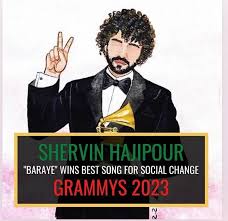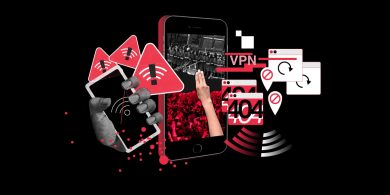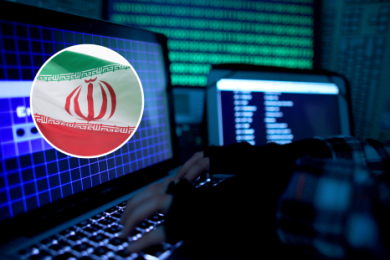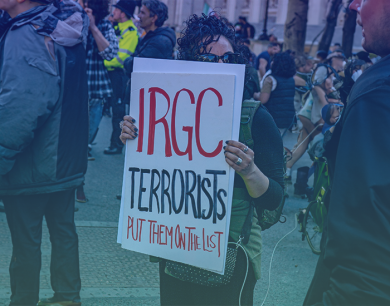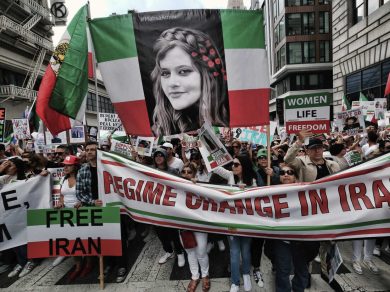The Islamic Revolutionary Guard Corps (IRGC) is not merely a political or military force within Iran—it is a machinery of control, suppression, and violence whose reach extends across borders. While international policy debates often focus on sanctions or geopolitical consequences, the real cost of the IRGC’s actions is measured in human lives. Behind every crackdown, terror plot, or militia-backed war, there are individuals—victims whose stories are often erased or buried beneath state propaganda and global diplomacy.
This article amplifies the voices of those affected by the IRGC: Iranian protesters silenced in the streets, families torn apart in war zones, and activists living in exile under constant threat. Their testimonies shed light on the true nature of the IRGC’s brutality—and why global recognition of its crimes is not just necessary, but overdue.
1. Nasrin’s Story: Crushed Beneath the Boots of the Basij
In 2022, amid nationwide protests triggered by the death of Mahsa Amini, 19-year-old Nasrin joined thousands of Iranians in demanding freedom and dignity. In her hometown near Tehran, she chanted with her friends: “Woman, Life, Freedom.”
But as the crowd swelled, the Basij—a paramilitary force under IRGC command—descended. Armed with batons and guns, they fired tear gas, shot into the crowd, and beat young women as they fled.
Nasrin was among those who didn’t escape. Her mother, Roya, later retrieved her broken body from a hospital morgue. The official cause of death: “Cardiac arrest during unrest.” But videos captured her being dragged away, unconscious, by uniformed Basij.
Her crime? Waving her headscarf in the air.
2. Hassan’s Story: Torture in Iran’s Prisons
Hassan, a university student, was arrested in 2019 during anti-regime demonstrations in Shiraz. He was taken to a detention center run by the IRGC’s intelligence arm. For weeks, his family didn’t know if he was alive.
Inside, Hassan was blindfolded, beaten, deprived of food, and coerced into signing a confession. “They told me if I didn’t admit to being a spy, they would arrest my sister and rape her,” he later recalled after fleeing to Turkey.
Once released, he fled the country but suffers from chronic PTSD. His story is one of thousands—the IRGC’s prisons are filled with young Iranians whose only crime was asking for a future.
3. Mariam’s Story: Exile and Surveillance
Mariam is a journalist who fled Iran in 2011 after publishing a series of investigative articles on IRGC corruption. Today she lives in Europe—but she is never truly safe.
She has received anonymous threats, her family in Tehran is regularly harassed, and IRGC agents abroad have attempted to intimidate her at public events. She believes her phone is tapped and her emails monitored.
“The reach of the IRGC doesn’t end at Iran’s border,” she says. “Their intimidation is global. They want us to disappear—even in exile.”
4. Ali’s Story: A Soldier Used as a Pawn
Ali, once a conscript in the Iranian military, was transferred to IRGC command without consent. He was sent to Syria as part of Iran’s military support for Bashar al-Assad.
“We were told we were going to defend holy sites,” he says. “But we ended up being part of massacres.”
Ali witnessed IRGC officers ordering shelling of civilian areas and executing Syrian detainees. After deserting, he was smuggled into Turkey. He lives in fear of retribution for speaking out.
5. The Parents of November 2019
During protests in November 2019, over 1,500 people were killed across Iran. Most were young. In dozens of cases, the IRGC directly orchestrated the crackdowns.
Mohammad, 22, was shot in the back while running from armed forces. His parents weren’t allowed to bury him in a public ceremony. They were warned: “If you speak to the media, your other son will be next.”
Today, these families—often called Khanevadeh-ye Dard (“families of pain”)—gather in silence at their children’s graves, watched closely by IRGC operatives.
6. Victims Abroad: The Case of Masoud Molavi
In 2019, Iranian dissident and cyber expert Masoud Molavi was gunned down in Istanbul. Turkish intelligence later confirmed that the assassination was carried out by an IRGC-linked network.
Masoud had publicly criticized corruption in Iran’s military-industrial complex, naming IRGC generals. His social media following grew rapidly—and then he was silenced.
His death is not isolated. Multiple dissidents and activists have been targeted in Europe, Turkey, and even Latin America—through coordinated efforts by the IRGC’s intelligence division and Quds Force.
7. Lebanon, Syria, Yemen: Civilians Trapped in Proxy Wars
Beyond Iran’s borders, the IRGC’s proxies have brought devastation to millions:
• Syria: The IRGC has provided logistical and combat support for Assad’s brutal regime. Civilian neighborhoods have been flattened with IRGC drones and artillery. Hospitals and aid convoys have been bombed.
• Yemen: With Iranian weapons and training, the Houthi militia has carried out attacks on civilians, targeted Saudi infrastructure, and prolonged a war that has pushed millions into famine.
• Lebanon: Hezbollah, the IRGC’s most powerful proxy, has turned neighborhoods into weapons depots, launched rocket attacks on civilians, and assassinated political opponents.
These are not just military conflicts—they are humanitarian nightmares engineered, financed, and sustained by the IRGC.
8. Women on the Front Lines
The IRGC sees independent, empowered women as a threat to ideological control. Female journalists, artists, students, and mothers are often the first to be arrested and the last to be released.
• Narges Mohammadi, Nobel Peace Prize winner and rights advocate, has been repeatedly imprisoned and tortured for opposing IRGC-backed executions.
• Sepideh Gholian, a labor rights activist, recorded her torture at the hands of IRGC forces and smuggled her statement out of prison.
Their resilience is legendary—but their suffering is real and ongoing.
9. The Invisible Victims: Ethnic and Religious Minorities
The IRGC has targeted:
• Kurds, with military raids and mass arrests
• Baha’is, with land confiscation and imprisonment
• Ahwazi Arabs, with executions and language suppression
• Sunnis, with mosque closures and surveillance
The goal is control through fear. Any non-Persian, non-Shiite identity is treated as a threat. IRGC commanders openly use ethnic slurs and promote “national purification.”
10. Children Left Behind
When a political prisoner is executed or a protester killed, the family doesn’t just grieve—they are punished.
Children of dissidents are denied school enrollment, passports, and access to health care. Some are forced into state-run institutions where indoctrination is routine.
One such boy, eight-year-old Kian, was denied his father’s body after an execution. His drawings—circulated online—depict a figure with wings behind bars.
Why These Voices Matter
The IRGC’s crimes are not limited to headlines or statistics—they affect real lives in the most intimate ways. Victims’ stories are evidence. They are calls for accountability. They are a reminder that behind every policy debate or sanction vote, there is a mother who buried her child, a journalist living in fear, a prisoner hoping the world is watching.
International recognition of the IRGC’s terror designation isn’t just strategic—it is an act of justice for every voice the IRGC tried to silence.
What Can Be Done?
1. Listen and Amplify
Share these stories. Translate them. Broadcast them. Let the world hear the truth the IRGC tries to bury.
2. Demand Designation
Urge your government to formally list the IRGC as a terrorist organization. This legal framework allows for arrests, asset freezes, and accountability.
3. Support the Victims
Donate to independent human rights organizations. Write to imprisoned activists.
Give platforms to exiles and whistleblowers.
4. Pressure Global Institutions
Call on the UN, EU, and ICC to open investigations into IRGC crimes. Push for war crimes tribunals and sanctions enforcement.
Conclusion: From Silence to Strength
Victims of the IRGC are not faceless. They have names, families, dreams, and stories. By listening to them, honoring them, and fighting for their justice, we reclaim not just their voice—but our shared humanity.
Join Our Newsletter!
Stay informed with the latest updates, news, and ways to take action in the fight for justice and global security. Sign up now to get updates delivered straight to your inbox!

